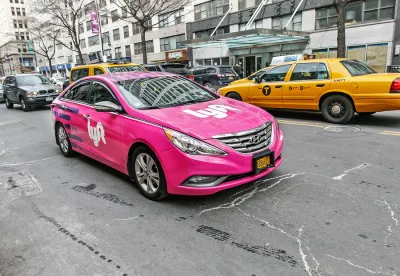Last week, the ridesharing giant, Uber, secured a resounding legal win when a federal judge dismissed a putative class action lawsuit alleging the company violated the Fair Labor Standards Act by failing to pay drivers overtime. The ruling is enormously important, not simply for Uber, but for the growing rideshare technology industry as a whole.
Less than a decade ago, outside of calling a cab company and hoping for the best, the notion of reliably getting from ‘here to there’ via a few button presses on a cell phone was unthinkable. Things have changed. Uber—the now-ubiquitous application that allows patrons to hail various styles of ride—has wholly disrupted the transportation service industry. According to the latest estimates, over 160 thousand Uber drivers dot the roads. Those drivers provide approximately 40 million rides each month, and the company’s 2017 valuation reached $69 billion. The term “Uber” has become a verb (e.g., “I’ll Uber there”) analogous to “just Google it” or “xerox the document.”
The Lawsuit: Razak v. Uber Technologies, Inc.
As most endeavors where the customer base grows exponentially and the company’s economic value skyrockets, Uber became a ripe target for litigation. For example, in 2016, three individuals brought suit against Uber in Pennsylvania state court. The Plaintiffs sought to certify a putative class of all persons who provided limousine services for UberBLACK via the Uber application in Philadelphia, Pennsylvania. The matter was quickly removed to federal court and proceeded before Judge Michael Baylson in the Eastern District of Pennsylvania. Razak et al. v. Uber Technologies, Inc., et al., Cause No. 16-573 (E.D. Pa.).
Plaintiffs’ allegations were relatively straightforward. In short, they alleged (i) they were non-exempt ‘employees’ of Uber within the meaning of the FLSA and, accordingly, qualified for overtime pay, and (ii) all time spent “Online” (i.e., logged into the Uber App and capable of accepting customer rides) for UberBLACK over 40 hours in a given week entitled them to overtime pay. For its part, Uber positions itself as a technology-service provider and explicitly not a transportation company. Stated another way, Uber views drivers as ‘customers’ who may use the App to provide transportation to individuals requesting rides via the platform. Drivers then pay a service fee to Uber on a per-ride basis.
Independent Contractors or Employees?
Certain procedural elements of the case are particularly noteworthy. Uber unsuccessfully attempted to halt the case at the pleading stage, filing motions to dismiss on the grounds that Plaintiffs failed to allege sufficient facts to qualify them as ‘employees’ rather than ‘independent contractors’ and, additionally, that Plaintiffs’ allegations of time spent Online in the Uber App were insufficient to state a claim for overtime pay under the FLSA. Judge Baylson denied Uber’s attempts to dismiss the case on the pleadings, but ordered expedited discovery and subsequent briefing on the limited issue of whether Plaintiffs’ Online time qualified as compensable work time under the FLSA.
After completing expedited discovery, Uber moved for judgment on the sole issue of whether Plaintiffs’ Online time was compensable. Notably, for the purposes of that motion only, Uber assumed that the Plaintiffs qualified as ‘employees’ and Uber was their ‘employer’ under the FLSA. Judge Baylson denied Uber’s motion, finding that the time Plaintiffs spent logged into the Uber App could be considered “predominately for the benefit of the employer rather than the employee.” Importantly, the denial was without prejudice to Uber’s ability to refile for summary judgment at the completion of discovery because, according to Judge Baylson, “the compensability question … may be inextricably intertwined with the threshold employee versus independent contractor question.” Consequently, the stage was set for Uber’s summary judgment motion on the issue of whether UberBLACK drivers are, in fact, employees or independent contractors.
The Ruling
Predictably, Uber filed for summary judgment on precisely that issue. The Court granted the motion and dismissed Plaintiffs’ case, finding UberBLACK drivers are independent contractors, and therefore not within the ambit of the FLSA.
Judge Baylson applied the Third Circuit’s three-decade old six-factor test in analyzing whether Plaintiffs were independent contractors or Uber employees. The test—highly-similar to that of other federal circuits—requires the Court to ascertain:
- The alleged employer’s right to control the manner in which the work is performed;
- The alleged employee’s opportunity for profit or loss;
- The alleged employee’s investment in equipment or materials;
- Whether the service rendered requires a special skill;
- The degree of permanence of the working relationship; and
- Whether the service is integral to the alleged employer’s business.
Of the six, the Court found factors 1, 2, 3, and 5 weighed heavily in favor of independent contractor status, while factors 4 and 6 tilted only slightly towards an employee finding. Accordingly, the Court’s ultimate conclusion that Plaintiffs were independent contractors was not a close call. In reaching this result, the Court found several facts critical:
- Drivers independently decide where to go to offer rides while Online;
- Uber places no restrictions on drivers’ ability to engage in personal activities while Online;
- Plaintiffs did, in fact, engage in personal activities including accepting rides from private clients, napping, smoking cigarettes, running personal errands, and taking personal phone calls;
- Uber allows drivers to simultaneously use competing software applications to accept rides and provide transportation;
- Plaintiffs spent a “large portion” of their time Online not actually completing trips for customers; and
- UberBLACK drivers must purchase or lease their own vehicles.
The Court also gave substantial weight to the Service Agreement executed between Uber and its UberBLACK drivers. Among other things, the Agreement provided that (i) drivers are ‘independent contractors; (ii) Uber does not and “shall not” control the drivers’ performance of their duties; (iii) drivers have the “sole right” to determine the manner and means of utilizing the App; and (iv) Uber has “no right” to require drivers to display Uber signage, wear a uniform, or otherwise display any Uber affiliation. In short, the Court found it legally significant that Uber’s Service Agreement went “beyond merely characterizing the extent to which Uber can control drivers [but] detail[ed] the many ways that Uber is not entitled to control [them].”
Takeaways
Judge Baylson’s order is a seminal result – not just for Uber, but for the entire rideshare technology industry. Indeed, an adverse outcome could have upended the entire space. The economic repercussions stemming from a legal determination that Uber’s 160,000-plus drivers are entitled to overtime simply by being ‘Online’ in the App more than 40 hours a week would have been staggering. Further, tort liability issues arising from a finding that this fleet of drivers are, in fact, Uber employees could result in endless and costly litigation, all of which would inevitably waterfall onto consumers. And while Plaintiffs’ counsel has vowed an appeal to the Third Circuit, the odds of a reversal are likely slim.
For their part, businesses who desire to solidify independent contractor status should take particular heed to the language of Uber’s Service Agreement, which the Court found materially compelling. Indeed, far too often companies rely on boilerplate language such as “you acknowledge you are an Independent Contractor,” that is ultimately toothless when weighed against the reality of the parties’ relationship. On the other hand, Uber’s Agreement—as Judge Baylson explicitly noted—contained affirmative covenants restricting what Uber itself could do in relation to the drivers’ performance of their duties. Consequently, in light of this recent ruling, businesses should work with counsel to reevaluate and solidify pre-existing independent contractor agreements that rely on impotent, uniform language that may expose them to liability.




 />i
/>i

